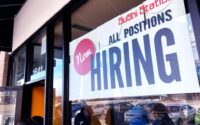Dow, stocks plunge as Credit Suisse sparks fresh bank selloff
Stocks dropped on Wednesday as turbulence at Credit Suisse renewed fears of a banking crisis, while data hinting at economic weakness kept alive hopes of a less aggressive monetary policy move by the Federal Reserve in March.
The Dow Jones Industrial Average plummeted 548 points, or 1.7%, to 31,606, the Nasdaq was down 1.2% and the S&P 500 slid 1.5%.
US-listed shares of Credit Suisse slid 24% to hit a record low, after the Swiss bank’s largest investor said it could not provide more financial assistance to the lender.
Fueling hopes of a less hawkish Fed policy, data showed retail sales fell 0.4% last month from a growth of 3.2% in January, while economists polled by Reuters had expected a contraction of 0.3%.
A separate report showed producer prices unexpectedly fell in February and the rise in prices in January was not as large as initially thought, offering some hopeful signs in the fight against inflation.

The data comes at a time when the collapse of SVB Financial and peer Signature Bank had already fanned fears about the health of other banks, fueling hopes that the Fed would steer clear of sharp rate hikes at its next meeting to ensure financial stability.
Yield on the 10-year Treasury notes fell to 3.47%, while that on the two-year note, which best reflects interest rate expectations, fell to 3.87% but was off session lows hit after the data.
Traders now see equal chances of a 25-basis-point rate hike and a pause at the Fed’s March meeting.
Follow The Post’s coverage of Silicon Valley Bank’s collapse
While assurances and emergency measures by US authorities had helped regional banks stage a rebound in the previous session, the lenders nearly erased those gains in early trade.
First Republic Bank fell 13.1% while peers Western Alliance Bancorp and PacWest Bancorp slid 7.1% and 18.4%, respectively, before trading in their shares was halted for volatility.
Big banks including JPMorgan Chase, Citigroup and Bank of America fell between 5% and 1%.
“Anything negative from any highly visible institution, in this case Credit Suisse, is going to have ripple effects across the financial sector,” said Michael James, managing director of equity trading at Wedbush Securities.
“Given all the turmoil with Silicon Valley Bank and Signature Bank, expectations have dramatically risen come that the Fed will keep rates unchanged, or maybe raise them (by) 25 basis points.”
Wall Street rallied in the previous session after a highly anticipated inflation report showed a slowdown in February consumer prices growth, spurring hopes of a smaller rate hike at the conclusion of the Federal Reserve’s meeting on March 22.
Shares of Charles Schwab fell 1.9%, a day after its chief executive said the firm has enough liquidity.


